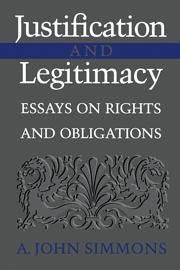Book contents
- Frontmatter
- Contents
- Introduction
- Acknowledgments
- 1 The Principle of Fair Play
- 2 Fair Play and Political Obligation: Twenty Years Later
- 3 The Obligations of Citizens and the Justification of Conscription
- 4 Associative Political Obligations
- 5 External Justifications and Institutional Roles
- 6 Philosophical Anarchism
- 7 Justification and Legitimacy
- 8 “Denisons” and “Aliens”: Locke's Problem of Political Consent
- 9 Human Rights and World Citizenship: The Universality of Human Rights in Kant and Locke
- 10 Original-Acquisition Justifications of Private Property
- 11 Historical Rights and Fair Shares
- 12 Makers' Rights
- Index
11 - Historical Rights and Fair Shares
Published online by Cambridge University Press: 05 June 2012
- Frontmatter
- Contents
- Introduction
- Acknowledgments
- 1 The Principle of Fair Play
- 2 Fair Play and Political Obligation: Twenty Years Later
- 3 The Obligations of Citizens and the Justification of Conscription
- 4 Associative Political Obligations
- 5 External Justifications and Institutional Roles
- 6 Philosophical Anarchism
- 7 Justification and Legitimacy
- 8 “Denisons” and “Aliens”: Locke's Problem of Political Consent
- 9 Human Rights and World Citizenship: The Universality of Human Rights in Kant and Locke
- 10 Original-Acquisition Justifications of Private Property
- 11 Historical Rights and Fair Shares
- 12 Makers' Rights
- Index
Summary
My aim in this paper is to clarity, and in a certain very limited way to defend, historical theories of property rights (and their associated theories of social or distributive justice). It is important, I think, to better understand historical rights for several reason: first, because of the extent to which historical theories capture commonsense, unphilosophical views about property and justice; next, because historical theories have fallen out of philosophical fashion, and are consequently not much scrutinized anymore; and finally, because of (what I see as) the continuing need to better understand the historical components of our society's responsibilities to the descendants of victims of systematic injustice in our own past. The case I will have in mind throughout is that of the property claims of Native American tribes, claims based on their historical standing as the original owners of certain lands and resources. And while I will concentrate here only on the question of rectifying past violations of property rights, this will constitute at least a start to answering more general questions about just rectification, which includes the more serious and less compensable wrongs of violence against persons.
By now we are all familiar with Robert Nozick's distinction between historical arguments for property rights (or for the justice of particular distributions of rights) and end-state arguments for rights or justice. Historical arguments maintain that whether or not a holding or set of holdings is just (that is, whether or not we are entitled to or have a moral right to our holdings) depends on the moral character of the history that produced the holdings.
- Type
- Chapter
- Information
- Justification and LegitimacyEssays on Rights and Obligations, pp. 222 - 248Publisher: Cambridge University PressPrint publication year: 2000
- 1
- Cited by



